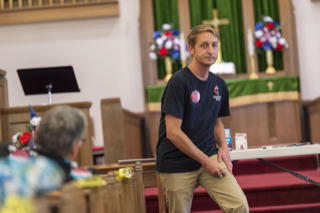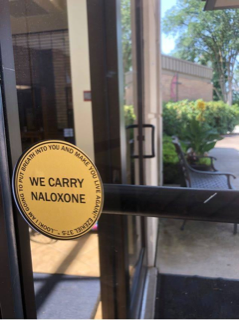“Look! I am going to put breath into you and make you live again!” — Ezekiel 37:5
Something caught Melissa Corbett’s eye on her drive from work one Monday evening in Logan. It was only a young man walking, but something about him made her turn around.
“I was about to exit and leave to go home,” she said, “and I had the overwhelming thought, ‘drive back through town.’”
At first, she resisted the urge. She’d just dropped off mail and was ready for her work day to end.
“But God said, ‘Melissa, drive back through town,’ and I made the circle back through,” she recalled. “I saw the young man again. This time he was lying on the ground with very little movement in his body.”
Corbett, who attends Nighbert Memorial United Methodist Church, stopped her car and grabbed her purse — not because she worried about someone stealing its contents, but because she knew she needed it. It’s where she keeps her Narcan.
“When I got to him, my thoughts were confirmed,” she said. “He was blue, not breathing, and no more movement in his body.”
The young man had overdosed.
As she shouted for someone to call 911, Melissa reached into her purse, grabbed the Narcan, and began to administer it the way she had just been trained — at church. By the time medical help arrived to help her administer a second dose, the man’s color had returned.
“Through the grace of God and the Ezekiel Project training, I was able to put breath back into him and give him life,” Melissa said.
The Ezekiel Project is a ministry of Winfield United Methodist Church, where the Rev. Chris Scott and a leadership team, including Corbett, are on a mission to train 37 faith communities across the state in naloxone use by Aug. 31, 2022, Overdose Awareness Day.
(Narcan, like Corbett used, is a brand of naloxone, an opioid antagonist. According to the website drugabuse.gov, naloxone can quickly restore normal breathing to a person if their breathing has slowed or stopped because of an opioid overdose. Naloxone has no effect on someone who does not have opioids in their system, and it is not a treatment for opioid use disorder.)
But training is not the only goal. The Ezekiel Project also aims to eliminate the stigma associated with people who use drugs and the misconceptions surrounding substance use disorder.
“Substance use disorder is not a character flaw,” Scott said. “It is not a moral failing. But it is a disease, and if we understand it as a disease, and if we understand people’s stories, we can ultimately help change those numbers.”
The numbers are high. In West Virginia, drug overdose deaths involving opioids totaled 702 in 2018, according to the National Institute on Drug Abuse.
Babies are affected by the problem, too. The incidence rate of Neonatal Abstinence Syndrome and Neonatal Opioid Withdrawal Syndrome (NAS/NOWS) in West Virginia in 2017 was 56.2 cases per 1,000 hospital births and is the most recent data available. To compare, the national incidence rate of NAS/NOWS in 2016 was 7 cases per 1,000 hospital births.
“So that statement I hear of ‘Well, we’re church people. We don’t know people we would ever have to use naloxone for,’ that hurts,” Scott said. “And what hurts me about that statement is twofold. First, statistically, yes you do know someone. Statistically, you know a family member, a friend, or a family member’s friend who suffers from substance use disorder.

“And second, if we are in the middle of this crisis, if our state is suffering this way, and yet our church communities are so disconnected, then that says something about our church,” Scott said. “It says something about our communities and how we’re reaching them.”
It boils down to the fact that people with substance use disorder are treated differently than people with other diseases caused by unwise health choices. The Ezekiel Project wants to change that.
“We don’t punish people with obesity or heart disease. Doctors don’t refuse to treat you because you shouldn’t have had that second piece of pie,” he said. “But there is that stigma with the disease of substance use disorder.
“We have such a need and such a problem,” he continued, “and I think what convicted me the most is that one of the largest barriers we have is stigma. There is so much that we could do if we were able to just love people where they are and not expect them to reach our standard of what goodness and honor looks like before we help them.”

The training is simple, Scott said. Churches and church members can be equipped to help — just like Melissa Corbett did — in 30 minutes. Participating churches will also receive stickers that quote Ezekiel 37:5 and say “We carry naloxone.”
“That sticker can speak volumes,” Scott said. “If the first thing someone sees on a church is that sticker, then they know there is at least one person in that church’s leadership who is a safe person to talk to.”
The training also provides connections, so that churches can help put those in need in touch with recovery options and continue working with agencies in the community.
“Of course our ultimate hope is recovery and sobriety, but you can’t get to that place if you’re dead,” Scott said. “Where there is breath, there is hope. That’s our goal, to help people stay safe, alive, and healthy until they are ready to get treatment and help.”
The Ezekiel Project isn’t ready to stop at naloxone training and stigma elimination. It also wants to be a faith-based movement to advocate for the full spectrum of harm reduction. Scott said HIV and hepatitis-C rates have skyrocketed in the wake of reduced needle exchange programs in West Virginia, so much so that the state is being compared to the nation’s largest cities.
“We need to do everything we can to stop people from dying,” Scott said, pointing to U.S. Centers for Disease Control and Prevention statistics from 2019 and 2020 that show Kanawha County with nearly as many new HIV cases diagnosed among IV drug users as New York City.
“The number one hotspot for HIV in the country is Kanawha County, West Virginia,” Scott said. “And new cases of hepatitis-C are five times the national average in our state. … We need to do everything we can to help people stay alive.”
For more information about The Ezekiel Project, or to schedule a naloxone training at your church, visit The Ezekiel Project on Facebook, or contact Rev. Chris Scott at christo.scott@gmail.com.